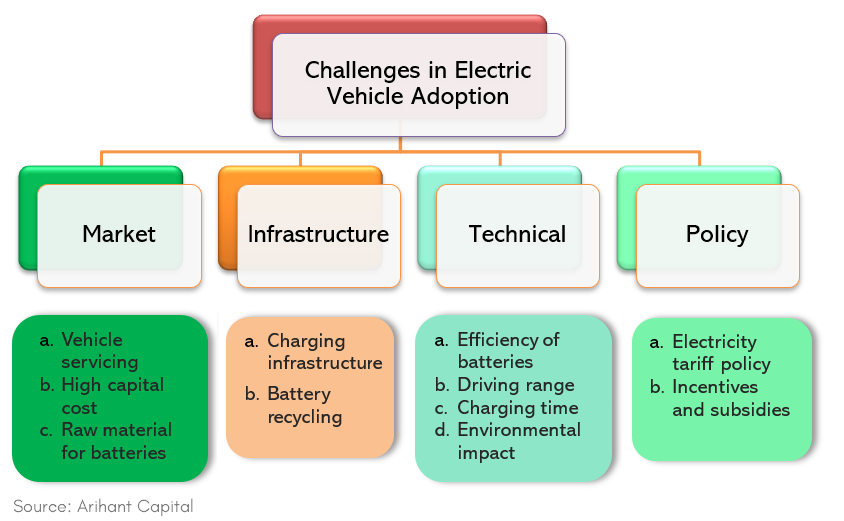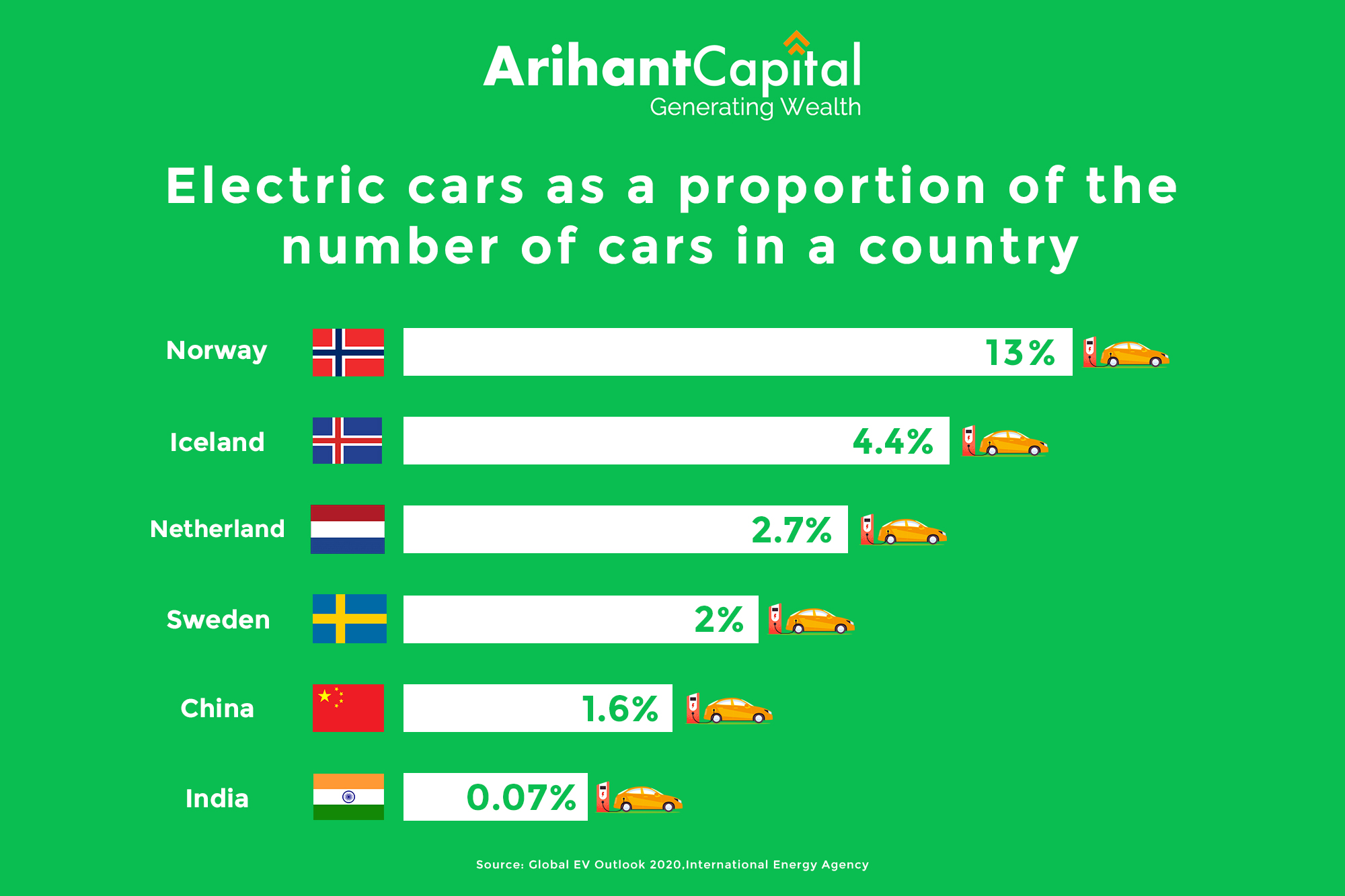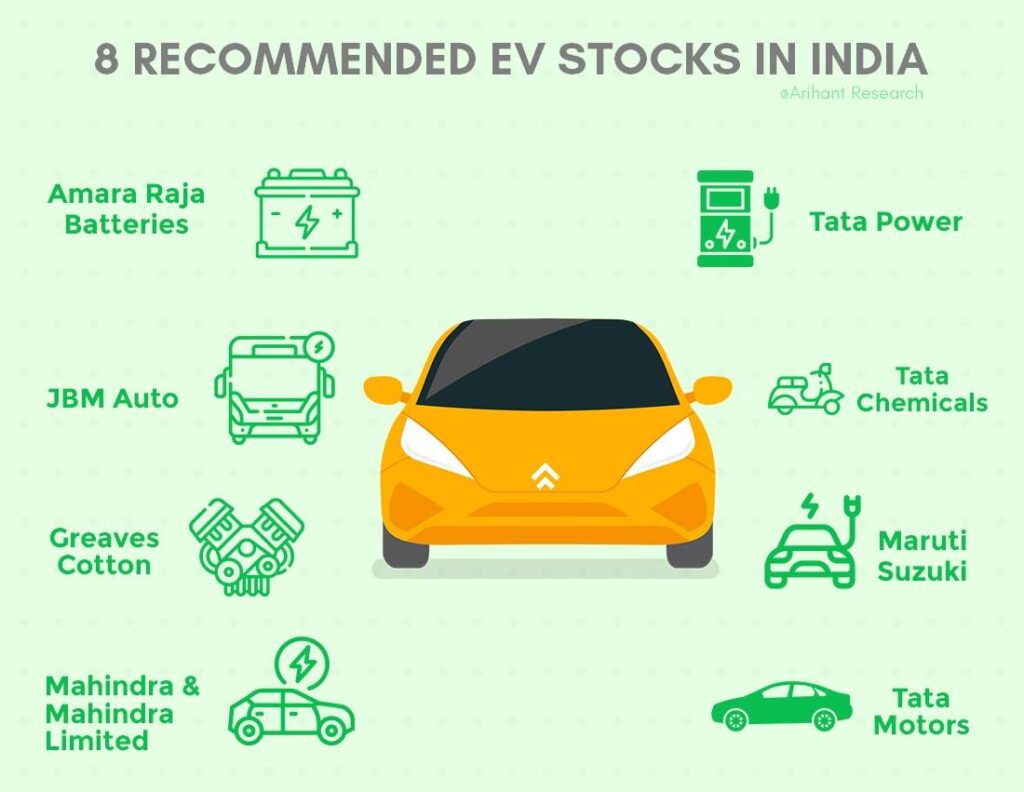India’s Electric Vehicles Push For a Greener Future & Eight Stocks That May Benefit

In this article:
- What is an electric car?
- Benefits of Electric Cars over Fuel Cars
- Challenges in Consumer Adoption of Electric Cars
- Status of Indian electric market
- Government policies to promote electric vehicles
- Are electric vehicles truly eco-friendly?
- Should you buy an electric car?
- 8 listed Indian companies that could benefit from EV growth
2020 was all about adapting to a “new normal”. The pandemic has made many of us more tech-savvy. Before Covid-19 hit our lives, aside from WhatsApp or Facetime calls to friends and family, few people knew anything about video conferencing software.
Fast-forward 2021, even your mom {and perhaps grandma} can set up a Zoom call with ease. And that’s not it. Online shopping for everything from groceries to pharmacy, online food delivery, and work from home have become the order of the day. The question is – will electric vehicles (EVs) also catch up at the same pace, especially since the government is making a big push towards a greener future?
The growing interest in electric vehicles should not come as a surprise considering awareness for green alternatives is growing at a rapid pace. Many countries, including India, are working on policies and incentives to phase out oil and gas in favor of renewable energy. This hugely benefits the EV sector as they represent one of the most promising pathways to reduced emissions of greenhouse gases (and other pollutants) and to increased energy security.
India’s push towards e-mobility partly stems from its overall environmental commitments under the Paris Climate Agreement where it must reduce its carbon emission intensity, transition quickly to clean energy, create additional forest and tree cover by 2030 and contribute to the mitigation of the after-effects of climate change.
These changes are, in fact, a necessity for the country, which ranks seventh in ‘Climate Risk Index 2021’ that indicates that India is severely affected by global warming. Meeting the e-mobility targets will have multiple benefits, including cleaner air, improved health, and a reduced oil import bill.
During the Covid-19 pandemic India was one of the most affected economies and the sudden hike in diesel and petrol price made it a necessity to prioritize electric mobility. India is a participant country in the EV30@30 Campaign, a Clean Energy Ministerial initiative, which aims for the sales share of EVs to reach 30 percent by 2030. India has an ambitious EV target under which it expects 70% of all commercial cars, 30% of private cars, 40% buses, and 80% two and three-wheeler sales to be electric by 2030.
Tesla Inc co-founder and chief executive Elon Musk had in October 2020 said the company will enter the Indian market in 2021 (it would be exciting to see the stylish Tesla cars driving on Indian roads). In fact, the Indian government has been wooing Tesla to set up its electric vehicle manufacturing facility in India. For those who do not know, Tesla is world’s most popular electric car manufacturer, known as much for their abilities to move on electric power as the innovative {often path-breaking} technologies they offer.
The move toward electric vehicles is inevitable in a country like India. Given that India is largely dependent on oil imports to meet its energy needs, the expected increase in the sales of vehicles will also raise the import bill, with undesirable economic consequences. This makes a push towards EV complete sense not just for the government but also consumers because owning cars that run on electricity is more affordable and will lower country’s emissions considerably.
What is meant by Electric Car?
Unlike conventional vehicles that use a gasoline or diesel-powered engine, electric vehicles use an electric motor powered by electricity from batteries or a fuel cell. An all-electric car runs only on electricity, and when powered exclusively with renewable electricity like solar or wind, charging and operating an EV can be nearly emission-free.
Electric cars use a larger version of a battery similar to your mobile, which connects to an electric motor that turns the wheels. The car’s other functions such as climate control, lights & stereo are all electrically powered too. Broadly there are three kinds of electric cars at present:
- EVs (also known as plug-in electric vehicles) derive all or part of their power from electricity supplied by the electric grid. They include AEVs and PHEVs.
- AEVs (all-electric vehicles) are powered by one or more electric motors. They receive electricity by plugging it into the grid and storing it in batteries. They consume no petroleum-based fuel and produce no tailpipe emissions. AEV include Battery Electric Vehicles (BEVs) and Fuel Cell Electric Vehicles (FCEVs)
- PHEVs (plug-in hybrid electric vehicles) use batteries to power an electric motor, plug into the electric grid to charge, and use a petroleum-based or alternative fuel to power the internal combustion engine (ICE). Some types of PHEVs are also called extended-range electric vehicles (EREVs).
In this article, we use the term electric vehicles to refer to battery electric vehicles (BEVs).
Benefits of Electric Cars over Fuel Cars
Electric cars offer much lower operating costs compared to conventional cars, although the cost of an EV could be higher. On average, electric vehicles are 70-80% cheaper from a fuel and maintenance perspective, as there are only around 20 moving parts in an electric engine, compared with 2,000 in an internal combustion engine, which is a major consideration for many buyers who have high usage.
The ecological benefits of an EV include zero tailpipe emissions and a large potential for greenhouse gas emissions reductions when coupled with a low-carbon electricity sector. They also offer better efficiency than ICE vehicles.
So from the environmental perspective, EVs drastically reduces carbon emission, thereby positively contributing to climate change, improving public health (smoke-free) and reducing ecological damage. The carbon emissions of an electric car are around 17 – 30% lower than driving a petrol or diesel car, according to European Energy Agency, including electricity generation.
Challenges in Consumer Adoption of Electric Cars
The key reasons for the slow uptake of EVs have been the concerns of reliability and affordability due to the higher upfront pricing, lack of charging stations, and range anxiety. Reliability issues can be solved by having a clearly chalked-out charging infrastructure plan.

As far as the higher price of EVs is concerned, it can only be solved by achieving economies of scale – increasing the manufacturing of EVs. Equal effort should be made to increase the demand by lowering upfront pricing through incentives and subsidies.
Where do we stand?
Electric vehicles are the future of mobility but at present form a minuscule portion of the vehicles sold in India, and is being driven by e-rickshaws and electric two-wheelers at present. The four-wheeler segment is still small. Only 0.07% of overall cars sold in India are electric.
Electric vehicles are a huge market in countries like China and Europe while India is still struggling to catch momentum.

Currently, there are eight electric cars in India available for consumers, namely:
- Mahindra e20 Plus (₹8.81 lacs),
- Tata Tigor EV (₹9.54 lacs),
- Mahindra e-Verito (₹9.5 lacs)
- Tata Nexon EV (₹13.99 lacs),
- MG ZS EV (₹ 21 lacs),
- Hyundai Kona Electric (₹23.79 lacs)
- Mercedes-Benz EQC (₹99.03 lacs)
- Jaguar I-Pace (₹1.06 crore)
But this is not enough if India wants to become an EV-first nation.
Since 2009, our neighbour, China has invested $60 billion in subsidies and incentives for the EV sector compared to India, which offers a meagre $1.4 billion in subsidies. In terms of charging points, China has access to 1.2 million points compared to only 1000 in India.
The high cost of electric vehicles and inadequate charging infrastructure pose major challenges in selling electric vehicles in the country. India is dominated by mass- and low-cost mobility models, and with an expensive price tag EVs are struggling to penetrate the market.
Although EVs have garnered a lot of interest and are in the spotlight in the media, there is still time for them to come into the mainstream. For the next few years, the automotive industry will continue to ride on traditional car sales, at least in India.
However, the long-term outlook for EVs is strong. The significant shift in the expected volume of BEVs and PHEVs will be based on consumer sentiment, policy and regulation, and original equipment manufacturers’ (OEM) strategic commitments to EVs.
Covid-19 is changing how we travel. Many people have shown their interest in limiting their use of public transportation and of ride-sharing apps. In the short term, this will likely accelerate demand for cheap second-hand cars, but in the long term, this could translate into increased demand for EVs. A wider variety of electric car models on offer will also stimulate consumer purchase decisions going forward.
Government policies to promote electric vehicles
The central government is pushing efforts to slash oil imports by as much as 40 billion dollars with a goal of making 30% of vehicles run on electricity by 2030. Some of the major steps taken by the government to promote EVs in the country include:
- The GST rate for EVs is reduced from 12% to 5% and charging stations also reduced from 18% to 5%.
- Under the Faster Adoption and Manufacturing of Electric Vehicles (FAME) Scheme, the government allotted $1.4 billion for FAME II to benefit the Indian EV industry and its citizens.
- The government is providing an additional income tax deduction of ₹1.50 lacs under section 80EEB, for interest on loans taken to purchase an electric car.
- Various states are individually rolling out policies to encourage the use of EVs in their region. For example, Telangana State Government announced that EV owners would not pay any road tax. Hyderabad Government is also thinking of replacing diesel-run public transport vehicles with electric vehicles. In November 2018, the Delhi government released a draft policy that is aiming to convert 25% of their vehicles to EVs by offering various incentives and by setting up charging infrastructures. This policy is intended to develop a charging point at every 3 km by offering a subsidy of 100% (up to ₹30,000) and waiving the road tax, parking charges, and registration fee for EVs by 2023.
- Recently, the Ministry of Power announced that it would set up a charging station across 69,000 petrol pumps in India. Many Indian states are also complementing these efforts by designing their own policies to meet their local charging requirements.
We believe that the recent initiatives and various subsidies by the Indian Government will help push the e-mobility drive in India.
Are electric vehicles truly eco-friendly?
Electric cars produce about a third as much carbon dioxide per mile as a gasoline-powered car. Plus, if you are able to charge your car from completely renewable sources, say, solar panels on the roof of your garage or through wind turbines, you can drive as long as you want without generating any emissions at all. However, if your EV is running on electricity produced by burning dirty fossil fuels, it doesn’t matter if the EVs are not polluting while being driven, as this pollution was already released in some distant power plant. To ensure that electric vehicles can unleash their full potential to mitigate climate change, it is crucial to reduce the CO2 intensity of power generation.
As a consumer, from a pollution perspective, electric vehicles do not pollute the air wherever they go, hence improving the air quality of their neighbourhood and city. Compared to regular cars (combustion engine vehicles) their emissions from usage are far lower and they have clear health benefits, giving them an edge over ICE cars.

Several recent studies say that electric vehicles (EVs) are no less harmful to the environment than conventional fuel-based vehicles because the production of electric vehicles is a carbon-intensive process. The mining and processing of lithium, cobalt, manganese, nickel, and other indispensable raw materials required in the battery manufacturing process are huge energy guzzlers and it can release toxic compounds. In fact, CO2 emissions from manufacturing an electric car itself is almost double compared to manufacturing a regular car; mostly because of their batteries.
No car will ever be truly sustainable, and the arrival of an electric car will not change that. While EVs are not an ideal environmentally sustainable alternative, they fare far better compared to combustion engine vehicles that we traditionally drive with certain caveats.
To move perfectly in e-mobility and be truly energy efficient, India (and the world) needs to transition to clean energy generation in parallel.
So, the big question is, should you buy an electric car?
The true environmental benefits of driving an electric car kick in only when you drive them for 150,000 km or more. So if they are just driven for 70,000 km and then scrapped, their overall environmental performance does not look so good compared to conventional cars because of the extra energy used for their production.
We have already discussed that while electric cars may be more expensive to buy; from a fuel and maintenance perspective they are far cheaper making them lighter on your pocket in the long run.
Bottom line? Unless you really need a new car, stick to the one you already have. To support the industry that is driving on sustainability, you can instead, invest in EV fund or stocks.
If you are passionate about reversing climate change, use public transport, walk or cycle because they will be always better for the environment compared to driving your own car.
8 listed Indian companies that could benefit from EV growth

You don’t need to buy an electric vehicle to support the growth of the EV industry (or profit from it). Investing in companies that are riding on the electric wave will be an equally apt {or better} strategy. For one, unlike buying an electric car, you don’t need to shell out lakhs of rupees and can invest in them for as low as ₹1,000. It allows you to diversify your portfolio into sustainability and support the growth without putting extra pressure on the resources like you would if you bought a new electric car.
Here are eight Indian companies that can benefit from EV growth, and so can you (picked by Arihant’s research team):
1. Amara Raja Batteries
India’s second-biggest traditional battery
is focusing on building a Lithium-ion assembly plant soon, one of the main components of batteries used in electric vehicles. The company has already started to work in collaboration with different state governments to promote the use of electric vehicles.
Back in 2019, the company launched EV charging stations and battery swapping stations in the country in collaboration with Tirupati Municipal Corporation along with a fleet of electric auto-rickshaws as part of the central government’s Smart Cities program. Amara Raja has also collaborated with the Delhi government to set up charging stations across the region. However, the company recently got in trouble when the Andhra Pradesh Pollution Control Board (APPCB) for non-compliance with certain procedures. Consequently, it was asked to close two of its manufacturing facilities situated at Karkambadi and Nunegundlapalli, Chittoor District in Andhra Pradesh. Fortunately, the closure notice was lately suspended by the High Court.
2. JBM Auto
Headquartered in Gurugram, Haryana, JBM Auto is amongst the world’s leading manufacturers of key auto systems, electric vehicles and buses. According to the company’s website, JBM Auto started its journey in 1983, by foraying into the manufacturing of cylinders and later expanded into the manufacturing of auto components. In the last few years, the company has started focusing relentlessly on the electric vehicles market, tooling, and production of CNG & electric commercial vehicles such as low-emission buses in the country. Recently, the company introduced the ECO-LIFE series, which is a 100% electric bus, made in India.
The company is building an entire ecosystem for electric vehicles in order to become a one-stop solutions provider in the EV segment, which includes the know-how of key aggregates like battery and charging infrastructure which can be operated under different conditions across geographies.
3. Greaves Cotton
Mumbai-based engineering company Greaves Cotton Ltd, which manufactures engines, pump sets and heavy equipment, is betting big on EVs. Greaves has taken and later upped its stake in Coimbatore-based electric vehicle (EV) manufacturer Ampere Vehicles (it currently has an 81.23% stake in the company) in the last three years. Through Ampere, Greaves has signed an MOU with the Tamil Nadu Government to set up an e-mobility manufacturing facility at Ranipet.
Greaves has committed to setting up the state-of-the-art EV manufacturing facility at Ranipet and working furiously on getting incremental capacity so the company also transitions to a digital multi-brand retail outlet even in the middle of the pandemic. The Company continues to add that for Ampere the Fastest growing E-mobility retail network with 328+ dealers across 260+ cities & towns. Greaves is working on the localization for Ampere’s business, which will enhance its profitability.
Greaves is well-positioned to benefit from the government’s push towards the fast adoption of EVs.
4. Mahindra & Mahindra Limited
Mahindra & Mahindra has been leading the electric vehicles space in India with multiple products already launched in the market including electric cars (e2oPlus and eVerito), three-wheelers (passenger and cargo), and a cargo van. They continue to work on developing an EV platform by combining the capabilities of its operations across the world, including Detroit and Italy.
The company recently announced that it will put in fresh investments to the tune of Rs 3,000 crore on its electric vehicles business in the next three years, while it looks for more alliances and partnerships in the vertical. The company has a goal of putting 5 lakh EVs on Indian roads by 2025 and has already invested INR 1,700 crore in the EV business in India with another INR 500 cr on a new (R&D) centre.
In fact, we had a meeting with management in the month of March 2021 and they discussed the EV Strategy that Company is focusing on last-mile connectivity for EVs with products like TREO/TREO ZOR (Electric 3W). In the near term, the company has plans to convert some of the ICV UV into Electric UV (e-XUV300), with large-scale adoption in the long term. The company will come out with a Born electric EV platform.
In fact, apart from its existing EV launches in India, it has revealed a luxury electric vehicle Battista, a project under Mahindra-owned Automobili Pininfarina. This all-electric hypercar is designed and hand-built in very limited numbers at Pininfarina SpA in Italy.
5. Maruti Suzuki
India’s largest automobile company, by market share, Maruti is all set to ride on the EV growth in India, as it plans to launch an electric version of its popular Wagon-R model in the second half of 2021. The electric Wagon R is being manufactured at Gurugram Plant in India, especially for fleet testing. The car is expected to see good sales in the future given the wide network of Maruti and its popularity in the middle-class segment of India.
If we talk about the features of Maruti Wagon R:
- The charging time of the WagonR EV might be somewhere around 6 hours as compared to other EV competitors in the market, which take over 6 hours to charge on AC. This step could give the brand an upper hand over its competitor.
- Maruti might bring the option of fast charging as well, like its competitor, the Nexon EV which takes around an hour to charge through the Tata Power Fast Charging stations.
- WagonR EV is expected to have a range of approx 250km bracket on a full charge. The current range numbers in the country start from 312km by the Nexon EV up to 430km by the Mercedes-Benz EqC.
- Maruti features in EVs might be offered with reborn braking as standard so that it could gain some extra range numbers to stay relevant to the competition.
- Some other features like Connected Car Technology and Wireless Charging might be on offer
With the Covid-19 situation, demand for personal transportation will continue to remain very strong. A lot of people who earlier relied on Uber and Ola are now looking for their own personal vehicles. Maruti offers a lot of entry-level models, which will benefit them because, with the launch of their EV, a lot of first-time buyers will look at getting into Maruti rather than some of the other premium models.
6. Tata Chemicals
Tata Chemicals has lined up everything to kick-start the EV ecosystem. For example, it is building an energy storage system facility for mobility and stationary charging, with labs in Pune and Chennai. The company is working on a circular economy concept, wherein they will manufacture batteries, and cells and in the end recycle them and take out chemicals like Cobalt which can go back into building Lithium-ion batteries.
Investments of ₹800 crore have been lined up beside a cell manufacturing plant in Dholera, wherein 300 MW to 2 GW of energy storage capacity is planned. To put it in context, India doesn’t have lithium-ion manufacturing capacity.
7. Tata Motors
Tata Motors’ Jaguar Land Rover (JLR) has put a comprehensive strategy and plan in place under which it will shift its entire portfolio to electric in the next four years. The strategy, labelled as “Reimagine, has been put in motion under the leadership of JLR’s chief executive officer (CEO) Thierry Bolloré. Luxury British carmaker Jaguar Land Rover has been a wholly-owned subsidiary of Tata Motors, in which Tata Sons is the largest shareholder, since 2008.
The company will invest about £2.5 billion a year to drive its electrification plans, and develop connected services, and data-centric technologies for its luxury vehicles. While the Plug-in hybrids are already launched, Jaguar will completely migrate to BEVs in the future. The Jaguar I-Pace, an advanced all-electric luxury car, has been already in the market for the past two years. The next series of product launches are in the next 18-24 months with the new Range Rover, RR Sport and Defender 130. The full-electric BEV at LR will be likely in FY24.
In the domestic market, Tata Motors has the best-selling model in the EV space – the Tata Nexon EV. The company is well-positioned to benefit from the EV growth and should definitely be a part of your portfolio.
8. Tata Power
Tata Power is investing big-time in the EV segment and plans to create infrastructure for home charging and public charging stations including metro stations, shopping malls, theatres, highways, workplaces and individual homes and housing societies. They have initiated tie-ups with various automobile companies to provide customized solutions.
In Oct 2020, they have done a tie-up with MG Motors to offer charging solutions as per the requirement of their EV vehicle. The company is also collaborating with Tata Motors to offer high-speed EV charging solutions in various cities and highways. They have already set up high-speed EV charging stations CCS2 in cities like Jaipur, Bhubaneswar & Cuttack. The company has already installed more than 456 EV charging solutions (CCS) in 92 cities across the country. They are targeting more than 700 stations in 100 cities by the end of this year. To support its “Going Green” strategy, the company has done large investments in renewables also.
The company has already signed a Memorandum of Understanding (MoU) for setting up commercial-scale charging stations for EVs at retail outlets of Hindustan Petroleum Corporation Ltd (HPCL), and Indraprastha Gas.
We like Tata Power as a “Clean energy play” in the portfolio.
For investors with a risk appetite and seeking global diversification, in addition to the above companies, you can also invest in international companies (like Tesla and Nio) and EV exchange traded funds (ETFs) via platforms that offer investment options in international equities and ETFs.
To invest in stocks, open an account with Arihant.
Shruti Jain is Chief Strategy Officer (CSO) at Arihant Capital Markets Limited. She is passionate about investor education and sustainability.








